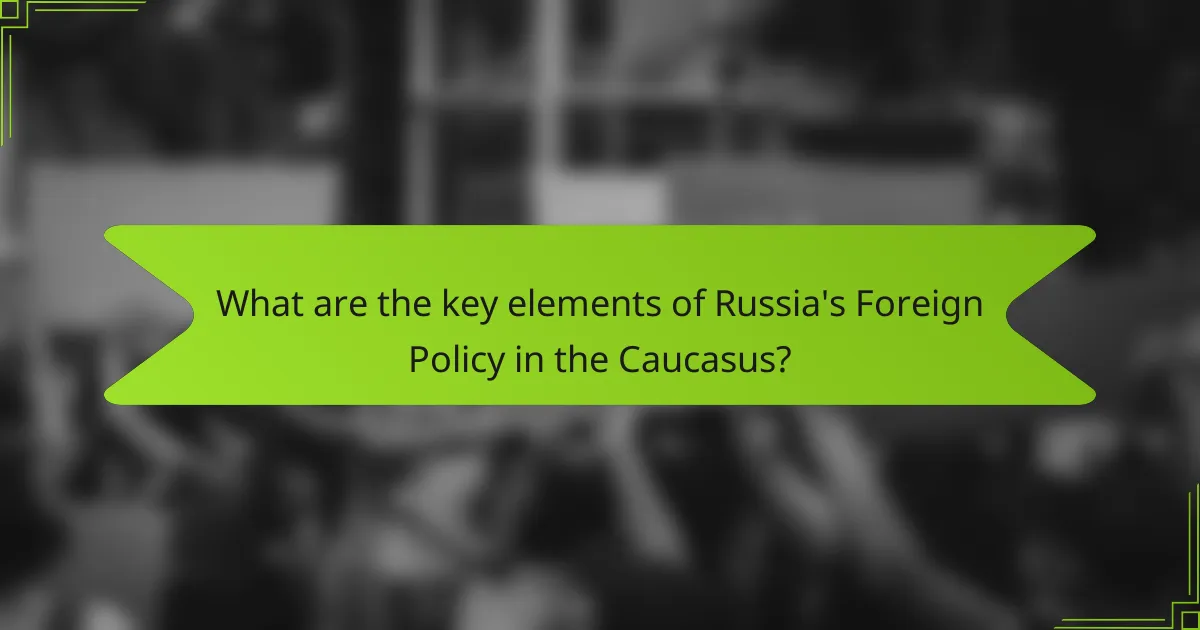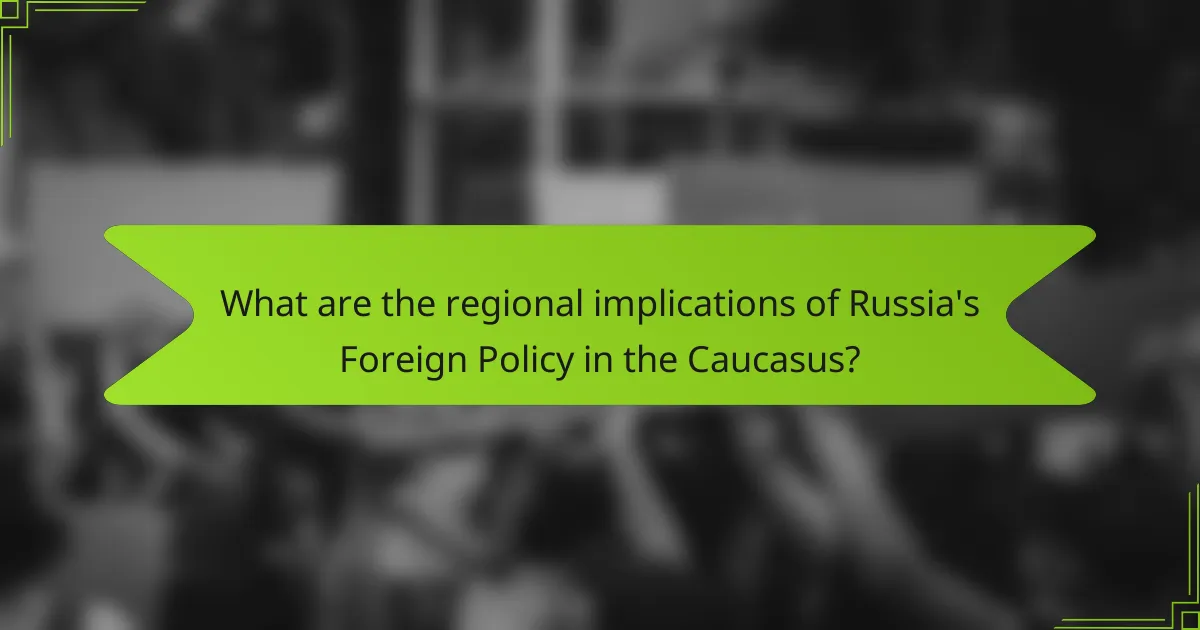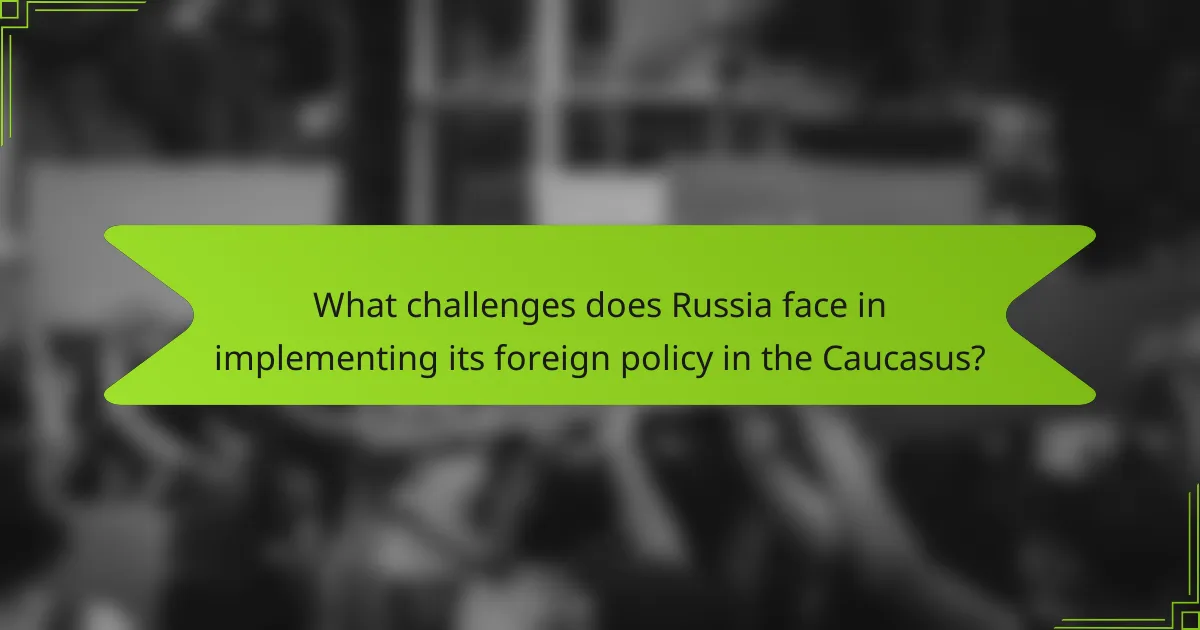Russia’s foreign policy in the Caucasus centers on security, influence, and energy resources, with a primary focus on maintaining regional stability. The strategy involves preventing conflicts that threaten Russia’s borders and asserting dominance over former Soviet states. Key components include military presence to deter external influences, economic cooperation to strengthen ties, and leveraging energy supplies to enhance regional leverage. The policy has significant implications, often leading to tensions with NATO and Western nations, while facing challenges from ethnic diversity, competing regional powers, and domestic instability. Overall, Russia’s actions play a crucial role in shaping the political landscape of the Caucasus.

What are the key elements of Russia’s Foreign Policy in the Caucasus?
Russia’s foreign policy in the Caucasus focuses on security, influence, and energy. The primary element is maintaining regional stability. Russia aims to prevent conflicts that could threaten its borders. It also seeks to assert its influence over former Soviet states. Energy resources play a crucial role in its strategy. Russia uses energy supplies to strengthen ties with regional countries. Military presence is another key element to deter external influences. Additionally, Russia promotes economic cooperation to enhance its leverage. These elements reflect its broader geopolitical goals in the region.
How does historical context influence Russia’s strategies in the Caucasus?
Historical context significantly influences Russia’s strategies in the Caucasus. Russia’s historical expansion into the Caucasus began in the 18th century. This expansion was driven by geopolitical interests and the desire for security. The region has a complex ethnic makeup, leading to ongoing tensions. Historical conflicts, such as the Caucasian War (1817-1864), shaped Russia’s approach to governance and military presence. The legacy of Soviet policies also impacts current strategies, as many local leaders were appointed based on loyalty to Moscow. Post-Soviet conflicts, particularly in Chechnya, have reinforced a strategy focused on military dominance and political control. Consequently, Russia’s current strategies are deeply rooted in its historical experiences and the need to maintain influence in a strategically vital region.
What historical events have shaped Russia’s relationship with Caucasian nations?
Russia’s relationship with Caucasian nations has been shaped by several historical events. The Russian Empire’s expansion in the 18th and 19th centuries led to conflicts with various Caucasian groups. The Caucasian War (1817-1864) was a significant military campaign that resulted in Russian dominance over the region. The incorporation of Chechnya and Dagestan during this war established a contentious relationship.
The Soviet era further complicated these dynamics. The forced collectivization and deportations during Stalin’s rule caused deep-seated resentment among the local populations. The collapse of the Soviet Union in 1991 led to renewed conflicts, particularly in Chechnya, which sought independence. The First and Second Chechen Wars (1994-1996, 1999-2009) highlighted the violent struggle for autonomy and Russia’s military response.
Additionally, the 2008 war with Georgia over South Ossetia and Abkhazia underscored Russia’s strategic interests in the region. These historical events have created a complex and often adversarial relationship between Russia and the Caucasian nations.
How have past conflicts affected current foreign policy approaches?
Past conflicts have significantly shaped current foreign policy approaches. Historical tensions, such as the Chechen Wars, have influenced Russia’s stance in the Caucasus. The desire for territorial integrity drives Russia’s interventionist policies. Additionally, past conflicts have fostered a perception of threat from neighboring states. This has led to a prioritization of military presence in the region. The 2008 war with Georgia further solidified a doctrine of preemptive action. Russia’s foreign policy now often emphasizes support for separatist movements. These strategies aim to counter Western influence in the Caucasus. Overall, historical conflicts have created a framework that guides contemporary diplomatic and military strategies.
What are the primary objectives of Russia’s Foreign Policy in the Caucasus?
The primary objectives of Russia’s foreign policy in the Caucasus include maintaining regional stability, securing its borders, and exerting influence over former Soviet states. Russia aims to prevent the rise of Western influence in the region. This is evident in its military presence and support for separatist movements. Additionally, Russia seeks to control energy resources and transportation routes. The region’s strategic location is crucial for Russia’s geopolitical interests. Historical ties and cultural connections also play a significant role in its policies. Russia’s foreign policy actions are often aimed at reinforcing its dominance in the Caucasus.
How does Russia aim to maintain regional stability?
Russia aims to maintain regional stability through a combination of military presence, diplomatic engagement, and economic partnerships. The country has established military bases in strategic locations within the Caucasus to deter potential conflicts. Russia also engages in peacekeeping missions, such as in South Ossetia and Abkhazia, to stabilize these regions. Diplomatic efforts include mediating disputes between regional actors and promoting dialogue. Economic partnerships, particularly in energy, strengthen ties with neighboring countries and enhance influence. These strategies collectively serve to reinforce Russia’s role as a stabilizing force in the Caucasus.
What role does economic influence play in Russia’s strategy?
Economic influence is a key component of Russia’s strategy in the Caucasus. It allows Russia to exert control over regional economies and secure political leverage. Russia invests heavily in energy projects, such as pipelines, which enhance its economic ties with neighboring countries. These investments create dependencies that bolster Russia’s geopolitical interests. Additionally, economic aid and trade agreements serve to strengthen alliances. For instance, Russia’s economic support to Armenia and Azerbaijan has implications for regional stability. This economic strategy also counters Western influence in the area. By leveraging economic tools, Russia aims to maintain its dominance in the Caucasus.
What strategies does Russia employ in its foreign policy in the Caucasus?
Russia employs a multifaceted strategy in its foreign policy in the Caucasus. This includes military presence, economic leverage, and diplomatic engagement. Russia maintains military bases in Armenia and South Ossetia to project power. It also supports separatist movements in regions like Abkhazia and Nagorno-Karabakh. Economically, Russia uses energy resources to influence regional states. It offers financial aid and investments to strengthen ties. Diplomatically, Russia acts as a mediator in conflicts, enhancing its role as a regional power. These strategies aim to secure its interests and maintain stability in the Caucasus.
How does military presence factor into Russia’s approach?
Military presence is a critical component of Russia’s approach in the Caucasus. It serves to project power and influence in the region. Russia maintains numerous military bases in countries like Armenia and South Ossetia. These bases enable rapid deployment of forces during crises. Military presence also acts as a deterrent against potential adversaries. The presence supports Russia’s strategic interests in maintaining regional stability. Furthermore, it facilitates military cooperation with local allies. This cooperation often includes joint exercises and arms sales. Overall, military presence is integral to Russia’s foreign policy objectives in the Caucasus.
What diplomatic initiatives does Russia pursue with Caucasian countries?
Russia pursues several diplomatic initiatives with Caucasian countries. These initiatives include fostering economic cooperation and security partnerships. Russia often engages in multilateral forums to discuss regional stability. It also promotes cultural exchanges to strengthen ties. Additionally, Russia plays a mediating role in conflicts involving Caucasian states. Bilateral agreements on trade and energy are common as well. The Collective Security Treaty Organization (CSTO) is another platform for military cooperation. Russia’s influence is evident in peacekeeping efforts in the region. Overall, these initiatives aim to maintain Russia’s strategic interests in the Caucasus.

What are the regional implications of Russia’s Foreign Policy in the Caucasus?
Russia’s foreign policy in the Caucasus has significant regional implications. It aims to maintain influence over former Soviet states. This influence is crucial for Russia’s security and geopolitical interests. The policy often leads to tensions with NATO and Western countries. Russia’s support for separatist movements in Georgia and Azerbaijan destabilizes these nations. Additionally, military presence in the region acts as a deterrent against Western encroachment. Economic ties through energy exports further entrench Russia’s dominance. Regional conflicts are exacerbated by Russia’s strategic interventions. Overall, Russia’s actions shape the political landscape in the Caucasus.
How does Russia’s policy affect relationships with neighboring countries?
Russia’s policy significantly influences relationships with its neighboring countries. It often employs a strategy of asserting dominance through military presence and economic influence. For instance, Russia’s annexation of Crimea in 2014 strained relations with Ukraine and other Eastern European nations. Additionally, Russia supports separatist movements in regions like Abkhazia and South Ossetia, impacting Georgia’s territorial integrity. Economic ties, such as energy dependency, further complicate these relationships. Countries like Armenia rely on Russian military support, which shapes their political landscape. Conversely, nations like Azerbaijan seek to balance relations with both Russia and the West. Overall, Russia’s assertive policies create a complex web of alliances and tensions in the region.
What impact does Russia’s presence have on NATO and EU interests in the region?
Russia’s presence significantly affects NATO and EU interests in the Caucasus region. It challenges the security framework established by NATO. Russia’s military activities in the area raise concerns over territorial integrity among neighboring countries. This presence complicates EU energy security initiatives, particularly regarding pipeline routes. Additionally, Russia’s influence can destabilize pro-Western governments. The ongoing conflict in Ukraine highlights the risks of Russian aggression. NATO has increased its presence in response, conducting military exercises to deter threats. This dynamic creates a complex geopolitical landscape for both NATO and the EU.
How do regional powers respond to Russia’s influence in the Caucasus?
Regional powers respond to Russia’s influence in the Caucasus through diplomatic engagement, military alliances, and economic partnerships. Countries like Turkey and Iran seek to counterbalance Russia’s dominance. Turkey strengthens its ties with Azerbaijan, particularly in energy projects, to reduce Russian leverage. Iran, on the other hand, engages with Armenia to maintain a foothold in the region. These actions reflect a strategic response to perceived threats from Russia. Additionally, regional powers often participate in multilateral organizations to assert their interests. For instance, the Collective Security Treaty Organization includes several former Soviet states that collaborate on security issues. This collective approach helps to mitigate Russian influence in the area.
What are the socio-economic implications of Russia’s strategies in the Caucasus?
Russia’s strategies in the Caucasus have significant socio-economic implications. These strategies often involve military presence and political influence. Such actions can lead to instability in local economies. For instance, the reliance on Russian support can hinder the development of independent economic policies. Additionally, regions like Chechnya have seen heavy investments, but these often come with strings attached. The socio-economic conditions can worsen due to corruption and mismanagement of funds. Moreover, the Russian government’s control over energy resources impacts local economies. This creates dependency, limiting opportunities for diversification. Overall, Russia’s approach shapes the socio-economic landscape of the Caucasus, influencing both growth and challenges.
How do Russian investments affect local economies?
Russian investments can stimulate local economies by increasing infrastructure development and creating jobs. These investments often focus on sectors like energy, construction, and agriculture. For example, in Armenia, Russian investments in energy have led to improved power supply and reduced costs. In Georgia, Russian capital has been pivotal in developing tourism infrastructure, boosting local businesses. Additionally, Russian investments can enhance trade relations, providing access to larger markets. However, they may also lead to economic dependency on Russia, which can be a concern for local governments. Overall, while Russian investments can bring significant benefits, they also pose risks that local economies must navigate.
What social dynamics are influenced by Russia’s foreign policy?
Russia’s foreign policy significantly influences social dynamics in the Caucasus region. It shapes ethnic relations, often exacerbating tensions between different groups. Russia’s support for certain political factions can lead to shifts in power dynamics. This support often creates dependency on Moscow among local leaders. Additionally, Russia’s military presence affects local perceptions of security and stability. The policy also impacts migration patterns, as people move in response to geopolitical changes. Furthermore, cultural ties fostered by Russia can influence social cohesion or division within communities. Overall, Russia’s actions in the region have profound effects on the social fabric of the Caucasus.

What challenges does Russia face in implementing its foreign policy in the Caucasus?
Russia faces several challenges in implementing its foreign policy in the Caucasus. The region is characterized by ethnic diversity and historical tensions. These factors complicate Russia’s diplomatic efforts. Additionally, competing interests from regional powers like Turkey and Iran create geopolitical tensions. Domestic instability in Caucasian republics further undermines Russia’s influence. Economic constraints limit Russia’s ability to project power effectively. Furthermore, public perception of Russian actions can lead to resistance among local populations. Lastly, the legacy of past conflicts continues to affect Russia’s relationships in the region.
What internal factors complicate Russia’s foreign policy efforts?
Internal factors complicating Russia’s foreign policy efforts include economic challenges, political instability, and social unrest. The Russian economy faces sanctions and declining oil prices, limiting its diplomatic leverage. Political instability arises from a lack of public support for the government. This instability can lead to unpredictable foreign policy decisions. Additionally, social unrest, driven by economic hardship, can divert attention from international issues. These internal dynamics create a complex environment for coherent foreign policy formulation. The interplay of these factors often results in reactive rather than proactive strategies.
How do regional separatist movements challenge Russia’s authority?
Regional separatist movements challenge Russia’s authority by asserting local autonomy against federal control. These movements often arise in regions with distinct ethnic identities, such as Chechnya and Tatarstan. They seek to establish independent governance, undermining the centralized power of the Russian state. The 1990s Chechen wars exemplify the violent clashes resulting from such aspirations. Additionally, ongoing protests and calls for independence reflect widespread dissatisfaction with Moscow’s policies. These challenges complicate Russia’s foreign policy and regional stability. The Kremlin’s response often includes military intervention and political repression. Such tactics can escalate tensions and lead to international scrutiny of Russia’s actions.
What economic sanctions or international pressures does Russia encounter?
Russia encounters significant economic sanctions and international pressures primarily from Western nations. These sanctions were imposed in response to Russia’s annexation of Crimea in 2014. The United States and the European Union targeted key sectors, including finance, energy, and defense. Sanctions restrict access to international financial markets and technology. Additionally, restrictions have been placed on Russian banks and state-owned enterprises. International pressure also comes from diplomatic isolation in various forums. Countries have condemned Russia’s actions in Ukraine and other regions. This has led to decreased foreign investment and economic growth challenges for Russia. Overall, these sanctions and pressures significantly impact Russia’s economy and geopolitical standing.
What external factors influence Russia’s foreign policy in the Caucasus?
External factors influencing Russia’s foreign policy in the Caucasus include geopolitical interests, energy security, and regional conflicts. Geopolitical interests drive Russia to maintain influence over former Soviet states. Energy security is crucial due to pipeline routes running through the Caucasus. Regional conflicts, such as those in Chechnya and Nagorno-Karabakh, shape Russia’s strategic responses. Additionally, relationships with neighboring countries like Turkey and Iran affect policy decisions. The presence of NATO and Western interests in the region further complicates Russia’s approach. Historical ties and ethnic considerations also play significant roles in shaping its foreign policy.
How do global geopolitical shifts affect Russia’s strategies?
Global geopolitical shifts significantly influence Russia’s strategies. These shifts alter Russia’s foreign policy priorities and military tactics. For instance, the rise of China has led Russia to strengthen its partnership with Beijing. This includes economic cooperation and military exercises. Additionally, tensions with the West prompt Russia to assert its influence in former Soviet states. The annexation of Crimea in 2014 exemplifies Russia’s response to perceived threats from NATO expansion. Furthermore, shifts in energy markets affect Russia’s economic strategies, prompting diversification of exports. Overall, global dynamics compel Russia to adapt its strategies to maintain regional power and security.
What role do international organizations play in the Caucasus region?
International organizations play a crucial role in the Caucasus region by promoting stability and development. They facilitate dialogue among conflicting parties, such as Armenia and Azerbaijan, to address territorial disputes. Organizations like the United Nations and the Organization for Security and Co-operation in Europe (OSCE) provide platforms for negotiation. Additionally, they offer humanitarian aid and support for economic development initiatives. For instance, the European Union has invested in infrastructure projects to enhance regional connectivity. These efforts help to mitigate tensions and foster cooperation among countries in the region.
What practical steps can be taken to understand Russia’s Foreign Policy in the Caucasus?
Analyze historical context and key events influencing Russia’s foreign policy in the Caucasus. Study the impact of the Soviet Union’s dissolution on regional dynamics. Review Russia’s military interventions and peacekeeping efforts in the region. Examine economic ties, including energy resources and trade agreements. Investigate bilateral relations with Caucasian states, such as Armenia and Azerbaijan. Assess the role of international organizations in shaping Russia’s policies. Monitor current news and expert analyses on Russia’s actions in the Caucasus. Engage with academic literature focused on geopolitical strategies in the region.
Russia’s foreign policy in the Caucasus is centered on security, influence, and energy, with the primary goal of maintaining regional stability and asserting dominance over former Soviet states. Historical context, including past conflicts and ethnic diversity, significantly shapes Russia’s strategies, which include military presence, economic partnerships, and diplomatic initiatives. Key objectives involve preventing Western influence, controlling energy resources, and fostering economic ties, while regional implications include tensions with NATO and relationships with neighboring countries. Challenges to Russia’s authority arise from separatist movements, economic sanctions, and competing regional powers, necessitating a nuanced understanding of the geopolitical landscape.